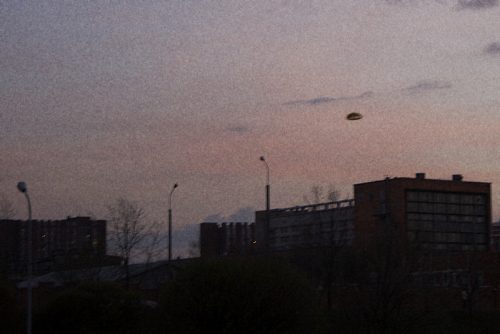Originally Posted at TSP Clippings

Throughout history, human beings have been enthralled by the idea of the paranormal. While we might think that UFOs and ghosts belong to a distant and obscure dimension, social circumstances help to shape how we envision the supernatural. In a recent interview with New York Magazine, sociologist Joseph O. Baker describes the social aspects of Americans’ beliefs about UFOs.
Baker argues that pop culture shapes our understandings of aliens. In the 1950s and 1960s, pop culture imagined aliens in humanoid form, typically as very attractive Swedish blonde types with shining eyes. By the 1970s and 1980s, the abductor narrative took hold and extraterrestrials were represented as the now iconic image of the little gray abductor — small, grey-skinned life-forms with huge hairless heads and large black eyes. Baker posits that one of the main causes of UFOs’ heightened popularity during this time was the extreme distrust of the government following incidents such as Watergate. Baker elaborates,
“I think there is something to be said for a lack of faith in government and institutions in that era, and that coincided with UFOs’ rise in popularity. The lack of trust in the government, and the idea that the government knows something about this — those two things went together, and you can see it in the public reaction post-Vietnam, to Watergate, all that stuff.”
While the individual characteristics of “believers” are hard to determine, survey evidence suggests that men and people from low-income backgrounds are more likely to believe in the existence of alien life. Baker says that believing is also dependent upon religious participation rather than education or income. In his words,
“One of the other strongest predictors is not participating as strongly in forms of organized religion. In some sense, there’s a bit of a clue there about what’s going on with belief — it’s providing an alternative belief system. If you look at religious-service attendance, there will be a strong negative effect there for belief in UFOs.”
Baker’s research on the paranormal indicates that social circumstances influence belief in extraterrestrial beings. In short, these social factors help to shape whether you are a Mulder or a Scully. Believing in UFOs goes beyond abductions and encounters of the Third Kind. In the absence of trust in government and religious institutions, UFOs represent an appealing and mysterious alternative belief system.
Isabel Arriagada (@arriagadaisabe) is a Ph.D. student in the sociology department at the University of Minnesota. Her research focuses on the development of prison policies in South America and the U.S. and how technology shapes new experiences of imprisonment.

Comments 2
robin — April 20, 2018
NYT did this piece last year with the research from psychologists
Alen — July 12, 2018
I need to write an research paper on paranormal phenomena. You can advice for me for free research paper websites or scholarly journals, where I can find useful information on this topic?